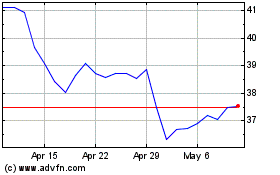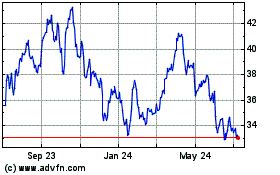Baker Hughes Reports Loss, Sees Further Decline in Rigs
January 28 2016 - 9:30AM
Dow Jones News
Baker Hughes Inc. swung to a fourth-quarter loss and reported a
49% decline in revenue as the oil-field services company continues
to feel the impact from the downturn in energy prices.
The company, which is in agreement to be acquired by Halliburton
Co., said Thursday that it sees current market conditions causing
further declines this year in the number of rigs being
operated.
In the fourth quarter, Baker was hurt by weakness in its North
America business, where revenue slid by two-thirds to $1.1 billion.
The company cited a steep drop in activity and the deterioration of
industry pricing conditions since early 2015.
Chief Executive Martin Craigshead said in prepared remarks on
Thursday that "since the fourth quarter of 2014, the global rig
count has declined 46% as our customers adjusted their spending to
align with declining commodity prices."
Mr. Craigshead said revenue in the December quarter dropped 10%
from the third quarter on a "sharp decrease in activity and ongoing
pricing pressure as [exploration and production] companies further
adjust their spending to the continued drop in commodity
prices."
Looking ahead, he said that "at current commodity prices, the
global rig count could decline as much as 30% in 2016, as our
customers' challenges of maximizing production, lowering their
overall costs, and protecting cash flows are now more acute."
Overall, Baker Hughes reported a loss of $1.3 billion, or $2.35
a share, compared with a year-earlier profit of $663 million, or
$1.52 a share. Excluding one-time items—which included a write-down
of its pressure-pumping product line in North America,
restructuring charges and expenses related to the Halliburton
deal—the adjusted per-share loss was 21 cents, compared with
year-earlier adjusted per-share earnings of $1.44.
Revenue slumped to $3.39 billion from $6.64 billion.
Analysts polled by Thomson Reuters expected a per-share loss of
10 cents and revenue of $3.47 billion.
The pending $35 billion acquisition of Baker Hughes by
Halliburton is facing more regulatory hurdles since European Union
regulators opened a full-blown antitrust investigation into the
deal earlier this month, warning it raised "serious potential
competition concerns."
The pending merger, which would unite the second- and
third-largest oil-field services suppliers, already has been facing
a growing list of antitrust concerns in the U.S., even as the slump
in oil prices complicates the firms' efforts to find buyers for any
assets that might need to be sold to ease regulators' concerns.
Oil-field services company have been cutting costs as customers
slash their spending plans to cope with a prolonged downturn in
energy prices. On Monday, Halliburton laid off an additional 4,000
workers at the end of last year as it lost money in the fourth
quarter on its oil-field drilling and services businesses.
Write to Tess Stynes at tess.stynes@wsj.com
(END) Dow Jones Newswires
January 28, 2016 09:15 ET (14:15 GMT)
Copyright (c) 2016 Dow Jones & Company, Inc.
Halliburton (NYSE:HAL)
Historical Stock Chart
From Mar 2024 to Apr 2024

Halliburton (NYSE:HAL)
Historical Stock Chart
From Apr 2023 to Apr 2024
